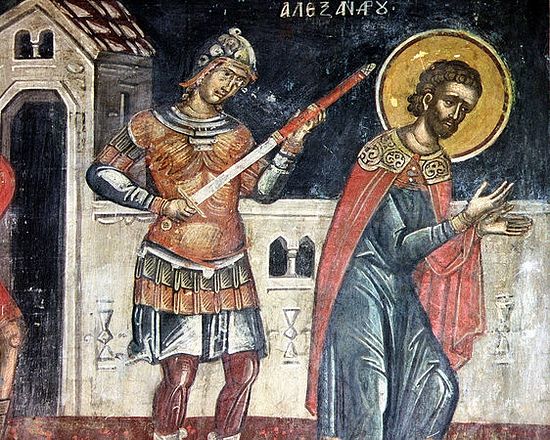The Holy Martyr Alexander suffered for Christ at the beginning of the fourth century. He was a soldier serving in the regiment of the tribune Tiberian at Rome. When he was eighteen, the Roman emperor Maximian Hercules (284-305) issued an edict that all citizens were to go to the temple of Jupiter outside the city on a designated day to offer sacrifice.
The tribune Tiberian assembled his soldiers and he ordered them to go to this festival, but Alexander, raised from childhood in the Christian Faith, refused and said that he would not offer sacrifice to devils. Tiberian reported to the emperor Maximian that there was a soldier in his regiment who was a Christian. Soldiers were immediately sent to arrest Alexander.
Alexander was asleep, but an angel woke him and warned him of his impending martyrdom, saying that he would be with him during this time. When the soldiers arrived, Alexander came out to meet them. His face shone with a light so bright that the soldiers fell to the ground when they saw him. The saint upbraided them and told them to carry out their orders.
Standing before Maximian, Saint Alexander boldly confessed his faith in Christ and he refused to worship the idols. He said that he was not afraid of the emperor, nor of his threats. The emperor tried to persuade the young man with promises of honors, but Alexander remained steadfast in his confession, and denounced the emperor and all the pagans. They tortured the holy martyr, but he bravely endured all the sufferings.
Maximian remanded Saint Alexander to the tribune Tiberian, who was being sent to Thrace to persecute Christians there. So they brought the martyr to Thrace, fettered in chains. At this time an angel told Saint Alexander’s mother, Pimenia, of her son’s martyrdom. Pimenia found her son in Carthage, where he stood before Tiberian and again he steadfastly confessed himself a Christian.
They subjected him to torture before the eyes of his mother, and then they took the prisoner on his final journey, walking behind Tiberian’s chariot. The brave Pimenia asked the soldiers to let her go to her son, and she encouraged him to undergo torments for Christ. The soldiers were astonished at the stoic strength of the martyr and they said one to another, “Great is the God of the Christians!”
The angel appeared to the martyr several times, strengthening him. By night a fearsome angel appeared to Tiberian with sword in hand, and commanded the tribune to hasten to Byzantium, since the martyr’s end was drawing near. Tiberian hurried on his way.
In the city of Philippopolis, Tiberian retried Saint Alexander in the presence of the city dignitaries gathered for this event. At this trial Saint Alexander remained steadfast. During his grievous journey the holy martyr had been repeatedly subjected to cruel tortures. He was strengthened by God, however, and he endured all the torments.
He gave strength to the soldiers weakened by thirst, asking the Lord to provide a spring of water for them. During the journey, the martyr prayed beneath a tree, asking for strength in his sufferings, and the fruit and leaves of this tree received a curative power. At a place named Burtodexion, the saint again met his mother Pimenia, who fell weeping at his feet. The holy martyr said to her, “Do not weep , my mother, for the day after tomorrow, the Lord shall help me finish matters.”
In the city of Drizipera Tiberian imposed the death sentence on the saint. The holy martyr gave thanks to the Lord for giving him the strength to endure all the torments, and to accept martyrdom. The soldier who was supposed to carry out the execution asked the saint’s forgiveness, and for a long time he could not bring himself to raise his sword, for he saw angels waiting to take the soul of the martyr.
The saint prayed and asked God to remove the angels, since he wanted to go to the Lord. Only then did he cut off the saint’s holy head. The saint’s body was cast into a river, but four dogs dragged it out of the water, and they would not let anyone near it, until Saint Alexander’s mother Pimenia came. She took up the remains of her martyred son and reverently buried them near the River Ergina.
Healings began to take place at the grave of Saint Alexander. Soon the holy martyr appeared to his mother in a dream, in which he comforted her and said that soon she too would be transported to the heavenly habitations.

